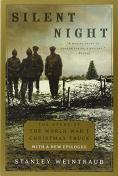BKMT READING GUIDES
Silent Night: The Story of the World War I Christmas Truce
by Stanley Weintraub
Paperback : 240 pages
5 clubs reading this now
0 members have read this book
Introduction
In the early months of World War I, on Christmas Eve, men on both sides of the trenches laid down their arms and joined in a spontaneous celebration. Despite orders to continue shooting, the unofficial truce spread across the front lines. Even the participants found what they were doing incredible: Germans placed candlelit Christmas trees on trench parapets, warring soldiers sang carols, and men on both sides shared food parcels from home. They climbed from the trenches to meet in "No Man's Land" where they buried the dead, exchanged gifts, ate and drank together, and even played soccer.
Throughout his narrative, Stanley Weintraub uses the stories of the men who were there, as well as their letters and diaries, to illuminate the fragile truce and bring to life this extraordinary moment in time.
Editorial Review
History is peppered with oddments and ironies, and one of the strangest is this. A few days before the first Christmas of that long bloodletting then called the Great War, hundreds of thousands of cold, trench-bound combatants put aside their arms and, in defiance of their orders, tacitly agreed to stop the killing in honor of the holiday.That informal truce began with small acts: here opposing Scottish and German troops would toss newspapers, ration tins, and friendly remarks across the lines; there ambulance parties, clearing the dead from the barbwire hell of no man's land, would stop to share cigarettes and handshakes. Soon it spread, so that by Christmas Eve the armies of France, England, and Germany were serenading each other with Christmas carols and sentimental ballads and denouncing the conflict with cries of "Ã? bas la guerre!" and "Nie wieder Krieg!" The truce was, writes Stanley Weintraub, a remarkable episode, and, though "dismissed in official histories as an aberration of no consequence," it was so compelling that many who observed it wrote in near-disbelief to their families and hometown newspapers to report the extraordinary event.
In the end, writes Weintraub, the truce ended with a few stray bullets that escalated into total war, and that would fill the air for just shy of four more Christmases to come; further, isolated attempts at informal peacemaking would fail. But what, Weintraub wonders at the close of this inspired study, would have happened if the soldiers on both sides had refused to take up arms again? His counterfactual scenarios are intriguing, and well worth pondering. -- Gregory McNamee
Discussion Questions
No discussion questions at this time.Book Club Recommendations
Recommended to book clubs by 0 of 0 members.
Book Club HQ to over 90,000+ book clubs and ready to welcome yours.
Get free weekly updates on top club picks, book giveaways, author events and more








